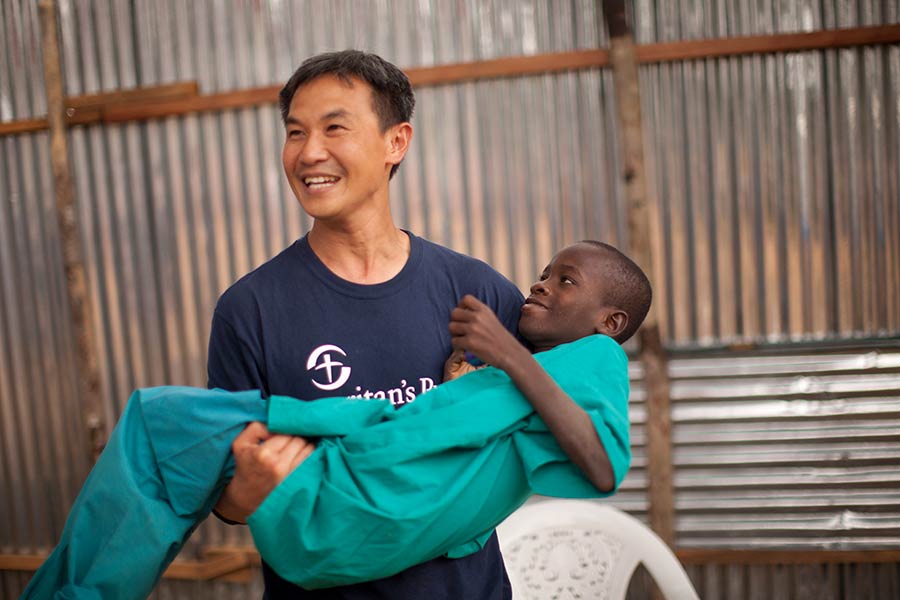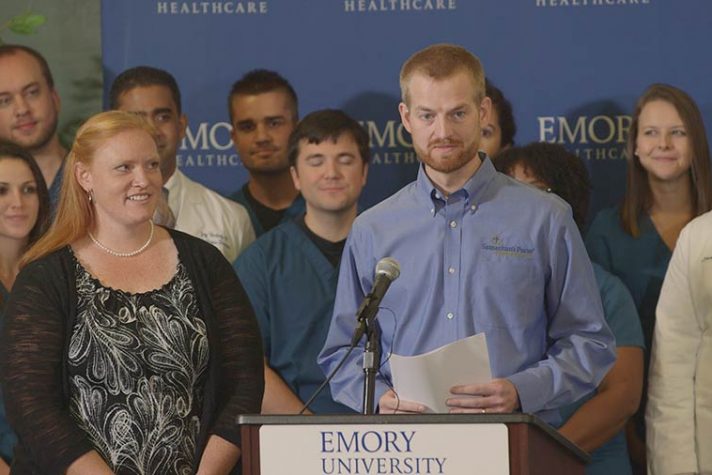
Millions of people watched on TV and online as Dr. Kent Brantly slowly stepped out of an ambulance in Atlanta, covered head to toe in a white hazmat suit. Two days earlier, he lay in a bed in Liberia, dying of Ebola.
“Faith is not something that makes you safe,” Brantly says in the documentary, Facing Darkness. In fact, he says, it was his faith that led him to have compassion on Liberians suffering from a cruel—often fatal—disease, and which ultimately meant watching himself go through the same things his patients experienced.
“This story is timeless because it’s really the story of the Good Samaritan … set against the backdrop of Ebola,” said Arthur Rasco, who, over a two-year period, directed and produced the movie.
The film by relief organization Samaritan’s Purse—who Dr. Brantly was serving with at the time of his diagnosis—follows a team of people who selflessly treated those left dying literally on the side of the road.

While Dr. Brantly shocked millions by emerging from the ambulance on his own two feet, many people are unfamiliar with all the puzzle pieces that came together leading up to it.
“This is the story behind the hours and days that it took to get there,” Rasco said.
Among those featured in the documentary are Dr. Brantly’s colleague Nancy Writebol, who also got Ebola, along with other Samaritan’s Purse staff involved in the Ebola crisis, Liberian President Ellen Johnson Sirleaf, and a Liberian nurse and single mom who contracted the disease.
Franklin Graham also shares his side of the story as president of Samaritan’s Purse, faced with the possibility of losing two members of the medical staff. He gets teary eyed, remembering the emotional stress of trying to care for them from thousands of miles away amid a terrifying, destructive disease.
“I think when there’s a crisis, God wants us to be there. He doesn’t want us to run away,” Franklin Graham says in the film. “Samaritan’s Purse looks for ways to get in the middle of it. Wherever we go in life, when we see people that are in need, God has put us there for a reason, and He expects us to do something about it.”
Which brings us to the heart of the movie: choosing compassion over fear—just as the Good Samaritan did.
>> Follow Facing Darkness on Facebook.
At a special advance screening of Facing Darkness, the audience shook their heads or gasped at tragic scenes and statistics they’d never seen or heard before. Some wiped away tears at moving stories of those left behind after the disease took their family members.
“Ebola was, in many ways, three years ago,” Rasco said, “but in some ways, it was just yesterday. You talk to Ebola survivors, Ebola widows, who’ve lost their whole families from it, and once they start telling you their stories, the tears just start running down their faces.”

Many Liberians are still stigmatized if they’ve had Ebola, he said, or if they have family members who died of it. People there still fear the disease.
It was August 2014 when Dr. Brantly left Liberia, bound for Emory University Hospital in Atlanta where he ultimately recovered from Ebola. He didn’t return to Liberia until the following year to visit his staff and thank them for their physically and emotionally hard work.
Rasco went along for footage, and together, the pair visited the same room Dr. Brantly was confined to when he contracted Ebola.
“He said, ‘Arthur, the whole time I had Ebola, I never cried,’” Rasco recounted. “He said, … ‘That first night I got back in this room, I cried. … Last time I was here, I didn’t know if I would see my wife again.’”
Bill Coger, the movie’s executive director, has seen the film many times now and said he gets emotional every time.
“I would only hope I could be anywhere near what these people did, showing compassion,” he said, reflecting on the Samaritan’s Purse team in Liberia.
For weeks after the first Ebola cases were recorded in late 2013, the impact of the disease was relatively ignored around the globe, leaving few to respond to what became the most widespread outbreak of the disease in history.
With little trust in the government and health care system in Liberia, the Samaritan’s Purse medical team was exhausted and overwhelmed with the epidemic.
Kevin Adamson, creative director for Facing Darkness, said the team who was on the ground during the hardest days of the outbreak poured their time into this movie. They gave hours of their time, he said, to tell the story and “show what God did through them.”
The documentary shares how the team returned time after time to prayer, relying on God for strength. It lays out a series of events—some heartbreaking, some joyful—that all came together in His miraculous timing.
“We wanted this story to be a testimony of God’s goodness and of His faithfulness,” Rasco said.
He also hopes it will “inspire a new army of Dr. Kent Brantlys, a new generation of missionaries to go out in the mission field—whether that’s the mission field in Africa, in Iraq … or the folks across the street, down the hall, that maybe we haven’t engaged with.”

